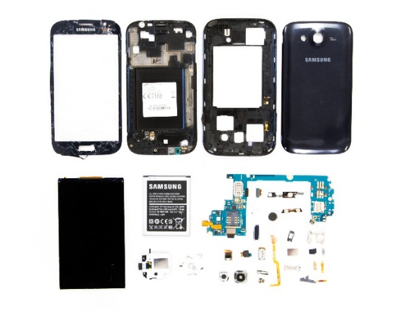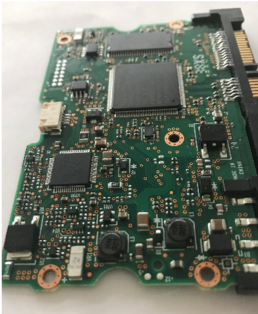Trashing Smartphones: What throwing away electronics costs us
The following content was created by Shahana Althaf in November 2018 as an educational sustainability blog post.

Technology addiction is at its peak today. New products enter the market on a daily basis, tempting us to upgrade our perfectly working gadgets with newer, shinier models. Gadgets like smartphones are replaced every couple of years.
So what do we do with our old products when we get a new one? Toss it in a drawer? Throw it in the waste bin? That’s what most people do. But what’s lost when we do so?
When you trash your old smartphone, you are trashing all the materials in them and all the energy that went into extracting them from Earth’s crust. One smartphone contains around 60 elements in the periodic table, which includes precious metals as well as many critical and rare earth elements.12

The printed circuit board in a phone (which makes it “smart”) contains many precious metals, like gold and silver. These metals are not only in high demand and expensive, but they are mined through processes that use a lot of energy resulting in many environmental problems, such as high carbon emissions.34
The touchscreen display that makes you feel that the world is at your fingertips contains indium, a metal that is very important to the modern electronics industry for manufacturing critical components in flat-panel display technologies like LCD TVs and monitors.
The battery in your phone that lets you stay connected wherever you go is made of critical metals like lithium and cobalt.1 Lithium is used by the electric vehicle industry to produce lithium ion batteries. Cobalt is considered a conflict metal because most of it is mined in the politically unstable Democratic Republic of Congo, making its price and availability vulnerable to the political situation there.5
Many of these metals exist in low concentration naturally and are obtained as byproducts during the processing of other metals from their ores, making their bulk production difficult. The fact that most of these metals are produced only in a handful of countries also puts their global supply at risk.
When millions of people trash their old electronics, tons of these metals end up in landfills. There they remain as hidden treasures, while elsewhere they are increasingly mined and transported to different parts of the world to meet growing demand. Recycling many of these technology-enabling metals from old electronics may even be cheaper than mining them.6
Instead of trashing your phones or letting them sit in your drawer when you are done with them, recycle them. Recycling old gadgets like smartphones would help recover precious earth metals and bring them back into the manufacturing pipeline to meet the ever-increasing demand for new technologies. This would not only bring economic benefits, but it would also reduce global dependence on the few countries that supply these metals. What more, recycling smartphones would help to avoid the environmental impacts associated with extracting precious metals from the ore.
Next time you upgrade your phone, take your old one with you. It can be recycled so that the valuable materials it contains can be used to make new smartphones.
References
- Althaf, S., Babbitt, C. W., Madaka, H., Gaustad, G. & Flynn, C. Sustainable Materials Management Metrics to Assess Consumer Technology. Summary Report of Phase 3 Research. (2019). Retrieved from https://www.rit.edu/gis/ssil/docs/Final%20Report%20SMM%20Phase%203%202019.pdf
- Hagelüken, C. & Corti, C. W. Recycling of gold from electronics: Cost-effective use through ‘design for recycling’. Gold Bull. 43, 209–220 (2010).
- Işıldar, A., Rene, E. R., van Hullebusch, E. D. & Lens, P. N. L. Electronic waste as a secondary source of critical metals: Management and recovery technologies. Resour. Conserv. Recycl. 135, 296–312 (2017).
- Wang, X. & Gaustad, G. Prioritizing material recovery for end-of-life printed circuit boards. Waste Manag. 32, 1903–1913 (2012).
- Steven, B. Y. & Goretty, D. LCM of metals supply to electronics : Tracking and Tracing " Conflict Minerals ". Soc. Sci. Res. Netw. 1, (2013).
- Zeng, X., Mathews, J. A. & Li, J. Urban Mining of E-Waste is Becoming More Cost-Effective Than Virgin Mining. Environ. Sci. Technol. 52, 4835–4841 (2018).





